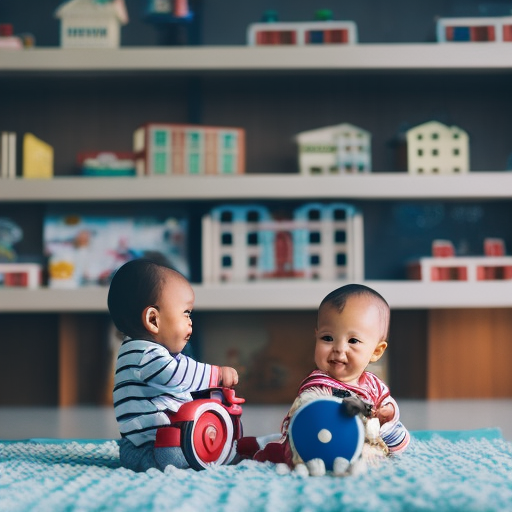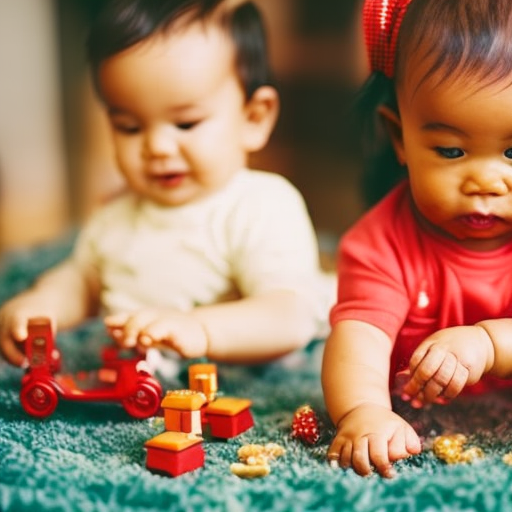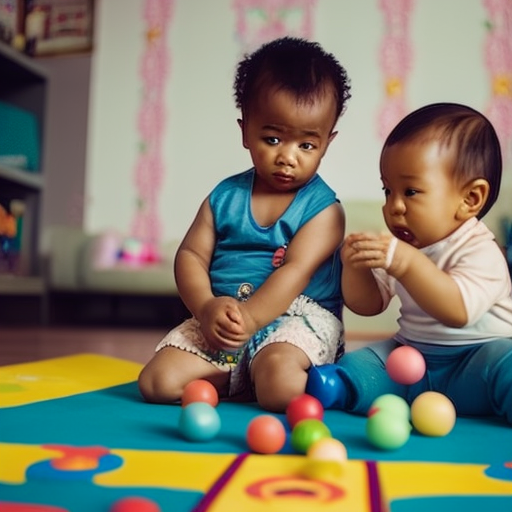"Cherishing Little Steps - A Haven for Baby and Family Journeys"
Navigating Toddler Friendships
Did you know that by the age of three, most toddlers have already started forming friendships? It’s fascinating how early social interactions begin to shape your child’s life.
But as a parent, navigating these toddler friendships can sometimes be challenging. How do you teach your child to navigate the complexities of relationships at such a young age?
In this discussion, we will explore the importance of toddler friendships, the common challenges that arise, and strategies for promoting positive peer interactions. So, let’s dive in and uncover how you can support your child in developing healthy and meaningful friendships.
Key Takeaways
- Toddlers develop important social skills during their crucial stage of life.
- Friendships shape understanding of empathy and cooperation.
- Managing conflicts is a common challenge for toddlers.
- Teaching conflict resolution skills and problem-solving is crucial.
Understanding Toddler Social Development

As a parent or caregiver, it’s essential to understand the intricacies of toddler social development in order to support and nurture the budding friendships of these young children. Toddlers are at a crucial stage of their lives where they begin to develop important social skills that will shape their future interactions. It’s during this time that they learn how to communicate, share, take turns, and empathize with others.
Promoting independence in toddlers plays a vital role in their social development. Encouraging them to make choices and solve problems on their own fosters a sense of confidence and self-reliance. When they have the freedom to explore their environment and interact with their peers, they learn valuable lessons about cooperation and teamwork.
As toddlers navigate the world of friendships, they may face challenges such as sharing toys or resolving conflicts. By observing their interactions and providing gentle guidance, you can help them develop essential social skills. Encourage them to express their emotions and communicate their needs effectively. Teach them the importance of listening and respecting others’ boundaries.
Understanding toddler social development requires patience and empathy. Each child develops at their own pace, so it’s important to provide an environment that allows for growth and learning. By promoting independence and nurturing their social skills, you’re setting the foundation for healthy and meaningful relationships in their future.
Recognizing the Importance of Friendships

Friendships are an integral part of a toddler’s social development, shaping their understanding of empathy, cooperation, and the importance of meaningful connections. As your toddler begins to interact with other children, they learn valuable social skills that will benefit them throughout their lives. Building social skills is a crucial aspect of their growth, helping them navigate the complexities of human relationships.
Here’s a table to help you understand the benefits of socialization and how it contributes to your toddler’s overall development:
| Benefits of Socialization | Building Social Skills |
|---|---|
| 1. Enhances Communication Skills | 1. Learning to Share and Take Turns |
| 2. Promotes Emotional Development | 2. Developing Empathy and Compassion |
| 3. Fosters Problem-Solving Abilities | 3. Understanding Different Perspectives |
| 4. Cultivates Self-Confidence | 4. Practicing Cooperation and Teamwork |
Through friendships, toddlers learn how to communicate effectively by expressing their thoughts and emotions. They also develop emotional intelligence, which allows them to understand and regulate their own feelings while empathizing with others. In social settings, toddlers encounter various problems and conflicts, providing them with opportunities to develop problem-solving skills and find creative solutions. By engaging in cooperative play, they learn the importance of teamwork and collaboration.
Recognizing the importance of friendships during the toddler years sets the foundation for healthy social interactions in the future. Encouraging your little one to form connections and navigate friendships helps them build a strong support system and fosters their overall social development.
Common Challenges in Toddler Friendships

Navigating friendships can sometimes present challenges for toddlers as they learn to navigate their own emotions and understand the complexities of social interactions. Managing conflicts is one of the common challenges that toddlers face in their friendships. Toddlers are still developing their communication skills and struggle to express their needs and desires effectively. This can lead to misunderstandings and disagreements, causing conflicts to arise.
As a parent or caregiver, it’s important to teach toddlers healthy ways to manage conflicts, such as using words to express their feelings and finding compromises that satisfy both parties.
Another common challenge in toddler friendships is fostering independence. Toddlers are at an age where they’re discovering their own identities and asserting their independence. However, this newfound independence can sometimes clash with the desire to fit in and be accepted by their peers. Toddlers may struggle with finding a balance between asserting themselves and compromising to maintain their friendships.
As an adult, it’s important to support and encourage toddlers to explore their independence while also teaching them the importance of empathy and understanding in maintaining healthy friendships.
Navigating the challenges of toddler friendships requires patience, guidance, and understanding. By teaching toddlers how to manage conflicts and fostering their independence, we can help them develop the necessary skills to navigate friendships successfully.
Promoting Positive Peer Interactions

One crucial aspect of supporting toddlers in their friendships is by encouraging positive interactions with their peers. Teaching conflict resolution and fostering inclusivity are vital skills that can help toddlers navigate social situations and build strong relationships.
To promote positive peer interactions, it is important to teach toddlers how to resolve conflicts peacefully. Encourage them to express their feelings and help them develop problem-solving skills. Teach them to listen actively, take turns, and find compromises. By providing guidance and modeling appropriate behavior, you can empower toddlers to handle conflicts in a constructive manner.
Another way to promote positive peer interactions is by fostering inclusivity. Help toddlers understand the importance of including others and being kind to everyone. Encourage them to play with different children, regardless of their background or abilities. By creating an inclusive environment, toddlers can learn to appreciate diversity and develop empathy towards others.
Here is a table that summarizes some strategies for promoting positive peer interactions:
| Strategies for promoting positive peer interactions |
|---|
| Teach conflict resolution skills |
| Encourage active listening and problem-solving |
| Model appropriate behavior |
| Foster inclusivity and appreciation of diversity |
Teaching Empathy and Problem-Solving Skills
Teaching toddlers empathy and problem-solving skills is crucial for their social development and ability to navigate relationships with their peers. As a parent or caregiver, you have the power to shape your child’s understanding of kindness and their ability to resolve conflicts effectively.
Teaching kindness begins with modeling it yourself. Show your child what it means to be compassionate and considerate towards others. Encourage them to engage in acts of kindness, such as sharing toys or helping a friend in need. By doing so, you’re laying the foundation for empathy to grow within them.
Conflict resolution is another vital skill for toddlers to learn. Help your child understand that disagreements are a normal part of relationships, but it’s important to find peaceful solutions. Teach them how to listen actively, express their feelings, and find compromises that work for everyone involved. By guiding them through these processes, you’re equipping them with the tools to navigate conflicts in a respectful and constructive manner.
Nurturing Healthy Boundaries in Friendships
Setting healthy boundaries in friendships is essential for fostering positive and balanced relationships. As toddlers begin to navigate the world of friendships, they’re learning how to interact with others and establish their own sense of self. By setting limits and fostering independence, parents and caregivers can help toddlers develop a strong foundation for healthy friendships.
One way to nurture healthy boundaries is by teaching toddlers to understand and express their own needs and desires. Encourage them to communicate their preferences and feelings to their friends, while also respecting the boundaries of others. This will empower them to assert themselves in a respectful manner, while also being mindful of the needs of their friends.
Another important aspect of setting healthy boundaries is teaching toddlers the concept of personal space. Help them understand that everyone has a right to their own physical and emotional boundaries. Encourage them to ask for permission before touching or hugging their friends, and teach them to respect the boundaries of others if they express discomfort.
Fostering independence is also crucial in nurturing healthy boundaries. Encourage toddlers to make their own choices and decisions within safe and appropriate limits. This will help them develop a sense of autonomy and self-confidence, which are essential for maintaining healthy friendships.
Supporting Your Child’s Emotional Well-being

Supporting your child’s emotional well-being is crucial for their overall development and happiness. As parents, it’s important to create a nurturing environment that promotes emotional growth and resilience. By focusing on their emotional development, you can help your child build the necessary skills to navigate through life’s ups and downs.
One way to support your child’s emotional well-being is by encouraging open and honest communication. Create a safe space where they feel comfortable expressing their thoughts and feelings. This can help them develop a strong sense of self-awareness and emotional intelligence.
Another important aspect is teaching your child how to manage their emotions effectively. Help them identify and label their feelings, and provide guidance on healthy ways to cope with challenging situations. This can include practicing deep breathing exercises, engaging in physical activities, or using creative outlets like drawing or journaling.
In addition, building resilience is crucial for your child’s emotional well-being. Encourage them to take on age-appropriate challenges and support them in their endeavors. Teach them that setbacks and failures are a part of life, and help them develop problem-solving skills to overcome obstacles.
Tips for Handling Friendship Conflicts

As your child develops friendships, it’s important to equip them with the necessary skills to handle conflicts that may arise. Conflict resolution and building resilience are crucial abilities that will serve them well throughout their lives.
Here are some tips to help your child navigate and resolve friendship conflicts:
-
Teach them effective communication: Encourage your child to express their feelings and needs assertively, while also actively listening to their friends. This will help them understand different perspectives and find common ground.
-
Encourage problem-solving skills: Teach your child to brainstorm solutions to conflicts and help them evaluate the pros and cons of each option. By involving them in the process, they’ll learn to take responsibility for resolving their own disputes.
-
Foster empathy: Help your child understand that everyone has different experiences and emotions. Encourage them to put themselves in their friend’s shoes, which will develop their ability to empathize and find compassionate solutions.
-
Role-play conflict scenarios: Act out different conflict situations with your child and guide them on how to respond. This will help build their confidence in handling conflicts effectively and peacefully.
-
Model healthy conflict resolution: Be a positive role model by demonstrating how to resolve conflicts in a calm and respectful manner. Your child will learn from your actions and mirror them in their own friendships.
Frequently Asked Questions
What Are Some Typical Milestones in Toddler Social Development?
Playdates play a crucial role in your toddler’s social development. As they interact with their peers, they learn important social skills like sharing and taking turns. Language development also aids in forming friendships as they communicate their needs and emotions.
How Can Parents Encourage Their Toddlers to Make Friends?
So you want to know how to encourage your toddler to make friends? Well, playdates and socialization are key. Encourage sharing and cooperation, and watch as those little friendships blossom. It’s a beautiful thing to witness.
What Are Some Common Challenges That Toddlers Face in Their Friendships?
Sometimes toddlers face challenges in their friendships, such as toxic friendships or conflicts. It can be tough for them to navigate these situations, but with your guidance and support, they can learn valuable social skills.
How Can Parents Teach Their Toddlers Empathy and Problem-Solving Skills?
Teaching your toddler empathy and problem-solving skills is crucial. It helps them understand others’ feelings and find solutions to conflicts. Show them kindness, encourage sharing, and guide them through conflicts with patience and understanding.
What Are Some Strategies for Nurturing Healthy Boundaries in Toddler Friendships?
To nurture healthy boundaries in toddler friendships, you can start by setting limits and establishing rules. By doing this, you provide a framework for your child to understand what is acceptable behavior and how to navigate social interactions.
Conclusion
You’ve journeyed through the realm of toddler friendships, navigating the nuances and nurturing the bonds.
From understanding their social development to promoting positive interactions, you’ve been the guiding light.
Remember, in this labyrinth of friendships, empathy and problem-solving skills are the golden keys.
Nurture healthy boundaries and support your child’s emotional well-being.
With these tools, you’ll conquer any conflict and cultivate lasting connections.
So go forth, fearless friend, and watch your little one’s friendships flourish!


